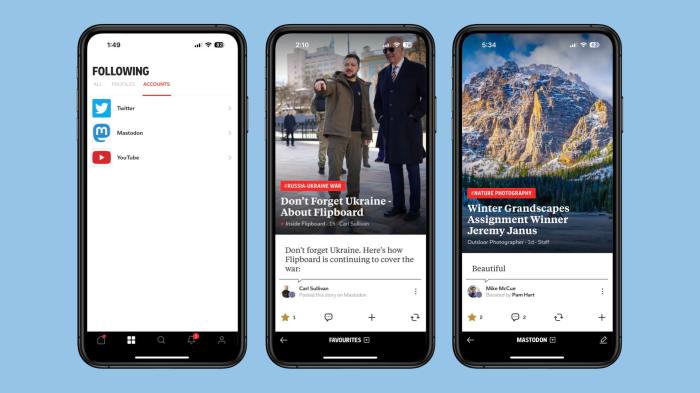Flipboard becomes a federated app with support for ActivityPub, marking a significant shift in the way users discover and share content. This move positions Flipboard within a decentralized web, embracing a future where users have more control over their data and interactions. The integration of ActivityPub, a standard protocol for communication between social networks, opens up new possibilities for interoperability and community building.
The transition to a federated model promises a more open and interconnected experience for Flipboard users. With ActivityPub, users can seamlessly connect with friends and followers across different platforms, expanding their reach and fostering a more vibrant online community. This shift aligns with the growing movement towards decentralization, empowering users and promoting greater transparency in online interactions.
Flipboard’s Transition to a Federated App
Flipboard, the popular news aggregator and magazine app, has embarked on a significant journey: embracing the power of federation. This move, driven by the adoption of the ActivityPub protocol, promises to reshape how users interact with Flipboard and consume news.
The Significance of ActivityPub
ActivityPub is a decentralized protocol that allows applications to communicate with each other seamlessly. By adopting ActivityPub, Flipboard joins a growing network of federated platforms, breaking free from the constraints of centralized control. This opens up a world of possibilities for Flipboard users, enabling them to connect with a broader range of content creators and communities.
Benefits for Flipboard Users
The transition to a federated model brings numerous benefits for Flipboard users:
- Enhanced Content Discovery: Users can now access content from a wider array of sources, including blogs, social media platforms, and independent publishers, expanding their news horizons beyond the traditional Flipboard ecosystem.
- Increased Control and Customization: Users gain greater control over their experience, choosing the content sources they want to follow and the communities they want to engage with. This empowers them to personalize their news feeds to align with their specific interests.
- Improved Privacy and Data Ownership: By decentralizing data, Flipboard reduces reliance on centralized servers, promoting user privacy and giving users more control over their personal information.
Features and Functionality Before and After Federation
The transition to a federated model introduces significant changes to Flipboard’s features and functionality:
| Feature | Before Federation | After Federation |
|---|---|---|
| Content Sources | Limited to Flipboard’s curated selection | Expanded to include content from ActivityPub-compatible platforms |
| Community Engagement | Limited to Flipboard’s internal community features | Enhanced with the ability to interact with users from other federated platforms |
| Data Ownership | Data primarily controlled by Flipboard | Users have greater control over their data and how it’s shared |
ActivityPub Integration and its Impact
Flipboard’s transition to a federated platform marks a significant shift in its functionality and user experience. This move leverages the power of ActivityPub, a decentralized communication protocol that allows users to interact with content across various platforms seamlessly.
Integrating ActivityPub into Flipboard’s platform presents both technical challenges and opportunities. The technical integration requires modifications to Flipboard’s existing infrastructure, including data storage, user management, and content delivery.
Technical Aspects of ActivityPub Integration, Flipboard becomes a federated app with support for activitypub
The technical aspects of integrating ActivityPub into Flipboard’s platform involve a significant overhaul of its existing infrastructure. Here’s a breakdown of the key areas:
- Data Storage: Flipboard needs to adapt its data storage system to handle ActivityPub’s decentralized nature. This means allowing users to store their data on their own servers, eliminating the reliance on centralized servers.
- User Management: ActivityPub requires a different approach to user management, as users are not solely managed by Flipboard. This means supporting federated identities, allowing users to log in using their accounts from other ActivityPub-compatible platforms.
- Content Delivery: Flipboard’s content delivery system must be redesigned to support the decentralized nature of ActivityPub. This involves implementing a mechanism to fetch and display content from various sources.
Challenges of ActivityPub Integration
Integrating ActivityPub into Flipboard’s platform is not without its challenges. Here are some of the key hurdles:
- Scalability: Handling a large volume of data and user interactions across a decentralized network can pose significant scalability challenges.
- Security: Ensuring the security of user data and communication across a decentralized network is crucial, requiring robust security measures to prevent data breaches and malicious activities.
- Compatibility: Ensuring compatibility with other ActivityPub-compatible platforms is essential to enable seamless interoperability and user interaction across different services.
User Experience Changes
The integration of ActivityPub into Flipboard significantly changes the user experience. Here’s how:
- Content Discovery: Users can discover content from various sources, expanding their reach beyond Flipboard’s curated selection.
- Social Interaction: ActivityPub enables users to engage with content and interact with other users on different platforms, fostering a more connected community.
- Content Ownership: Users have greater control over their content, allowing them to publish and manage it across different platforms.
The Future of Flipboard as a Federated App: Flipboard Becomes A Federated App With Support For Activitypub
Flipboard’s transition to a federated app marks a significant shift in the digital landscape, promising a more decentralized and interconnected experience for users. This move opens doors to exciting possibilities for content discovery, sharing, and community building.
Implications for Content Discovery and Sharing
Flipboard’s federation will significantly impact content discovery and sharing. By joining the ActivityPub network, Flipboard users can access content from various sources, including blogs, social media platforms, and other federated apps. This expands the scope of content discovery, allowing users to explore a wider range of perspectives and interests. Moreover, users can seamlessly share content across different federated platforms, fostering a more interconnected and collaborative digital environment.
Increased User Engagement and Community Building
The federated ecosystem promotes user engagement and community building. Users can interact with content creators and other users directly, fostering a sense of community and belonging. This direct interaction encourages deeper engagement with content and facilitates the creation of shared experiences. For example, users can participate in discussions, share their perspectives, and collaborate on projects, fostering a more vibrant and dynamic online environment.
Opportunities for Collaboration with Other Federated Platforms
Flipboard’s integration with ActivityPub opens doors for collaboration with other federated platforms. By connecting with platforms like Mastodon, Pixelfed, and PeerTube, Flipboard can leverage the strengths of each platform to offer a more comprehensive and enriched user experience. This collaboration can facilitate cross-platform content sharing, enabling users to access a wider range of content and connect with a larger community. For example, Flipboard could integrate with Mastodon to allow users to follow their favorite Mastodon accounts and discover relevant content within their Flipboard feed.
The Impact of Federation on the Digital Landscape
Flipboard’s decision to embrace federation marks a significant shift in the social media landscape. It paves the way for a more decentralized and interconnected digital world, challenging the established order of centralized platforms.
Comparison with Other Social Media Platforms
Flipboard’s federation strategy stands out from other social media platforms, such as Facebook, Twitter, and Instagram, which operate as centralized entities. While these platforms offer a vast user base and convenience, they also face criticism for issues like data privacy, censorship, and algorithmic manipulation.
- Centralized Platforms: These platforms control user data, content moderation, and algorithms, often leading to concerns about privacy, censorship, and algorithmic bias. They also hold significant power over the spread of information, potentially limiting user freedom and control.
- Federated Platforms: These platforms are built on a decentralized network, allowing users to control their data and content, and participate in a more democratic and transparent ecosystem. They offer greater user autonomy and resistance to censorship, promoting a more open and diverse online environment.
Potential Impact on the Future of Social Media
The adoption of federated models could fundamentally alter the social media landscape, empowering users and fostering a more equitable and diverse digital environment.
- Increased User Control: Federated platforms empower users by allowing them to control their data, content, and interactions. This shift in power dynamics could lead to a more personalized and user-centric online experience.
- Reduced Platform Dependence: Federated platforms encourage users to connect and interact across different platforms, reducing dependence on a single platform and fostering a more interconnected digital ecosystem.
- Enhanced Content Diversity: Decentralization can lead to greater content diversity, as users are free to choose their preferred platforms and communities, breaking down algorithmic silos and promoting a more inclusive online environment.
Implications of a More Decentralized and Interconnected Digital Landscape
The move towards a more decentralized and interconnected digital landscape has significant implications for the future of online interaction and information sharing.
- Greater Resilience: Decentralized networks are inherently more resilient to censorship and attacks, as they are not reliant on a single point of failure. This enhanced resilience can contribute to a more stable and secure digital environment.
- Empowered Communities: Federated platforms can empower communities by allowing them to create and manage their own spaces, fostering a sense of belonging and facilitating collaborative endeavors.
- Enhanced Privacy: Decentralized platforms offer greater control over user data, promoting privacy and reducing the risk of data breaches and exploitation.
Flipboard’s embrace of ActivityPub signals a move towards a more decentralized and interconnected digital landscape. By becoming a federated app, Flipboard joins a growing movement that challenges the dominance of centralized platforms and empowers users with greater control over their data and interactions. This transition has the potential to reshape the future of content discovery and sharing, fostering a more vibrant and collaborative online environment.
Flipboard’s move to become a federated app with support for ActivityPub is a big deal, signaling a potential shift towards a more open and decentralized internet. It’s a move that could be seen as a response to the trend described in this TechCrunch article about Instagram’s shift away from news and politics. By embracing ActivityPub, Flipboard could attract users who are seeking a more diverse and less controlled online experience, paving the way for a future where information flows more freely.
 Standi Techno News
Standi Techno News

